Honoring Unsung Heroes in the Fight Against Ocean Plastic Pollution
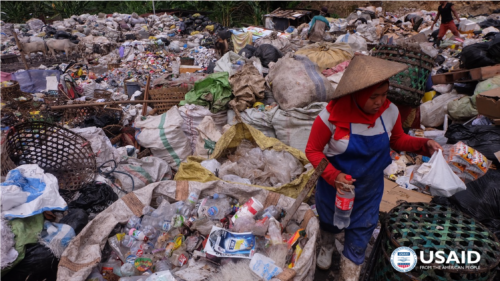
This World Oceans Day, we want to recognize some of the unsung heroes in the global fight against ocean plastics pollution: independent waste collectors or “waste pickers”.
Each year, eight million metric tons of plastic pour into the world’s oceans caused largely by ineffective solid waste management systems of rapidly urbanizing coastal cities in developing countries. The situation would be even more dire without the efforts of millions of waste pickers, many of whom operate in the informal sector. They collect and recycle materials that would otherwise go into landfills and illegal dumpsites or leak into the environment. “Despite their absence from most urban-development plans, waste pickers remain some of the most effective, affordable, and necessary waste managers and recyclers on earth, protecting both land and sea,” according to Taylor Cass Talbott, Reducing Waste in Coastal Cities Project Officer with Women in Informal Employment: Globalizing & Organizing.
Despite their contributions, waste pickers often find themselves marginalized, stigmatized, and unappreciated, laboring in difficult, unsafe conditions and without adequate protections. As part of our broader efforts to combat ocean plastics pollution, USAID is supporting waste pickers across Indonesia, the Philippines, Sri Lanka, and Vietnam. USAID’s Municipal Waste Recycling Program is providing training and equipping waste collectors, strengthening Independent Waste Collector organizations, and supporting their advocacy efforts.
Here are some stories of these environmental champions:
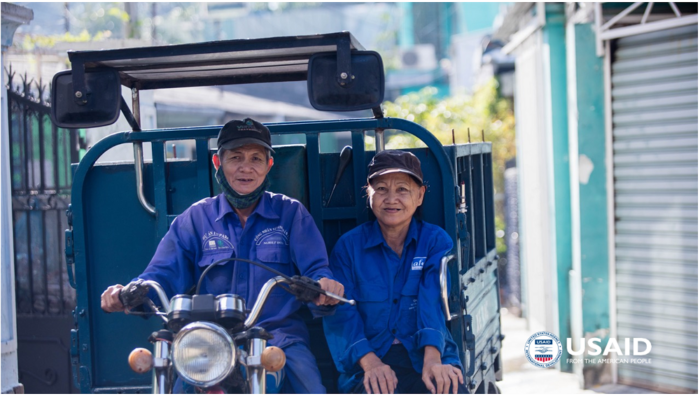
Independent waste collectors (IWCs) continue to deliver solid waste management services during the COVID-19 pandemic. This couple, Nguyen Thanh Liem and Pham Thi Thanh Ngoc, has been collecting waste in Ho Chi Minh City, Vietnam, for the past 14 years. USAID MWRP’s grantee Environmental Development Action in the Third World (ENDA) has provided IWCs in Ho Chi Minh City with health and safety trainings on waste handling and with personal protection equipment. Nguyen and Pham start their work before dawn, collecting trash bags from households in their neighborhood and bringing them to a designated transfer station for loading onto city garbage trucks. The onset of COVID-19 has increased the risk of their work as they sort through possibly infectious waste to pull out recyclable materials.
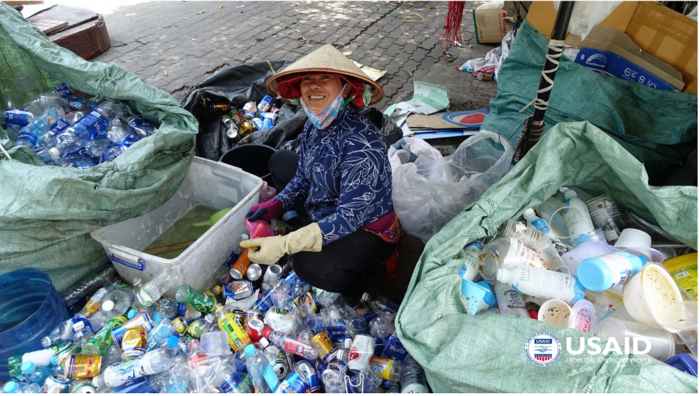
Women have an important role in urban solid waste management. Le Thi Kim Hoa collects waste in Ho Chi Minh City’s District #10, where an estimated 44% of the city’s independent waste collectors are women, many of whom are migrants from rural areas. USAID’s MWRP has facilitated the formation of several independent waste collectors cooperatives and unions, which in turn, have advocated effectively with the Ho Chi Minh City People’s Committee for higher garbage collection fees, resulting in an increase in incomes for independent waste collectors. In collaboration with the independent waste collectors cooperatives, MWRP grantee ENDA has helped women obtain leadership roles in the solid waste management sector.
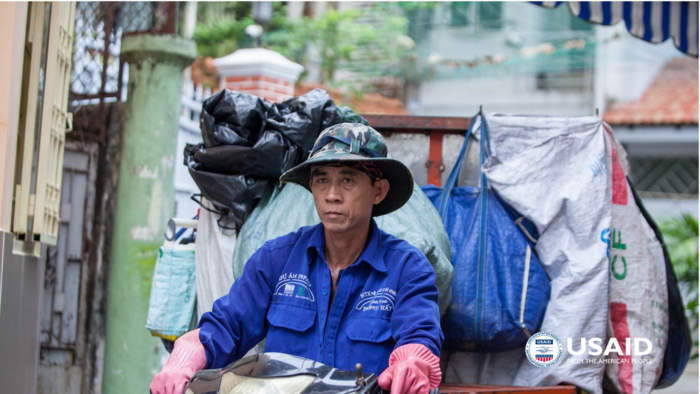
Independent waste collectors face social exclusion, discrimination, and marginalization. Mr. Du, a waste collector in Binh Thanh District, Ho Chi Minh City, notes that, “although we face many existing prejudices within the community, solid waste collection is a genuine, meaningful job.” He is a second generation independent waste collectors and is assisted by his son. Most households do not practice waste segregation at source, so Mr. Du, after collecting the waste, returns home to dig through contaminated garbage bags to sort and clean the recyclable materials. His USAID-supported independent waste collectors cooperative and its persistent two-year long advocacy work with city environmental offices for higher waste collection service fees have allowed Mr. Du to witness a marked increase in his monthly income.
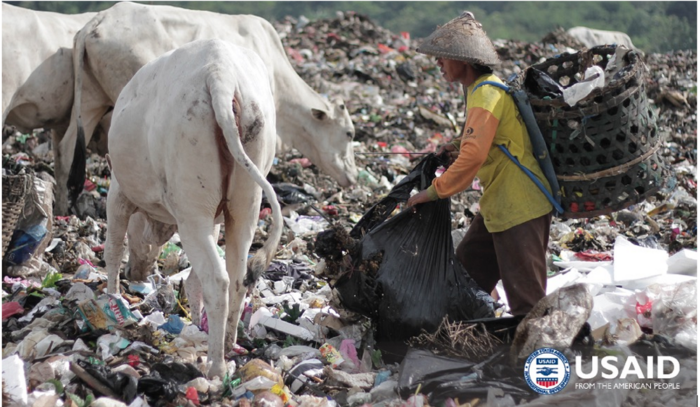
Independent waste collectors toil in inhumane conditions and live in poverty. At the Semarang City landfill in Jatibarang, hundreds of self-employed independent waste collectors rummage through the mixed waste to find recyclable materials suitable for resale. The work is hot, uncomfortable, dangerous and unhealthy. For their efforts, independent waste collectors earn less than 5 USD per day. In fact, most independent waste collectors earn low incomes. The closure in 2018 of the Chinese market for plastic recyclable waste materials combined with lower global oil prices have resulted in steep reductions in demand for recycled plastics and less income for independent waste collectors. USAID MWRP’s grantee Bintari trained more than 440 independent waste collectors and other community members, of which more than half were women, on proper waste handling and on the importance of waste segregation at source. Bintari has set up fifty waste banks in Semarang where the work is more comfortable and where independent waste collectors now get training and have access to protective gear when handling infectious waste.
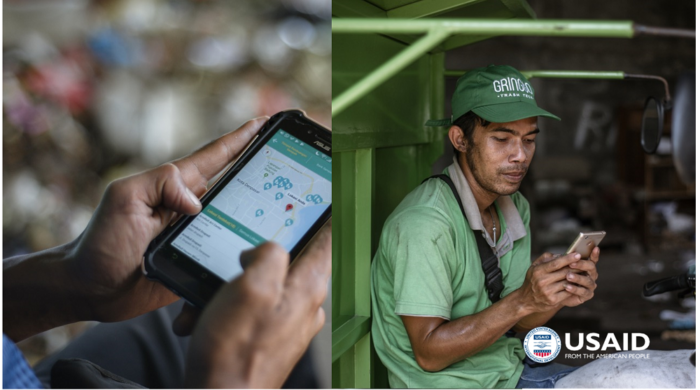
Harnessing technology to improve collection and livelihoods. With support from USAID, independent waste collectors in Sanur Kaja Village in Denpasar, Bali, are now using grantee Gringgo’s mobile phone application to track daily prices of recyclable materials purchased by local traders and consolidators. This simple, yet innovative mobile application enables these Indonesian independent waste collectors to maximize their income, by providing them with up-to-date information that they can leverage to get the best financial arrangements within the Denpasar plastic waste marketplace. Waste collectors operating in Gringgo’s project area have seen their monthly incomes go up by more than 30% since adopting the mobile application.
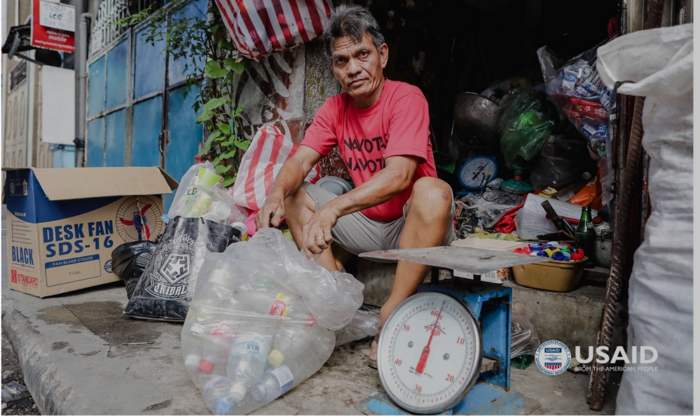
Independent waste collectors play a critical role in urban waste collection. Crisostomo Aguilar is the owner of a neighborhood-based “junk shop” microenterprise in Navotas City, Manila, a middleman in the Philippines plastic value chain. He purchases a wide variety of recyclable materials (plastics, metals, glass bottles, cardboard, etc.) from independent waste collectors for resale to large commercial recycling businesses. The USAID MWRP grantee Catholic Relief Services provides training to junk shop owners and independent waste collectors on best practices for coordination with the local government, record-keeping, health and safety, customer relations, service delivery, and market linkages.
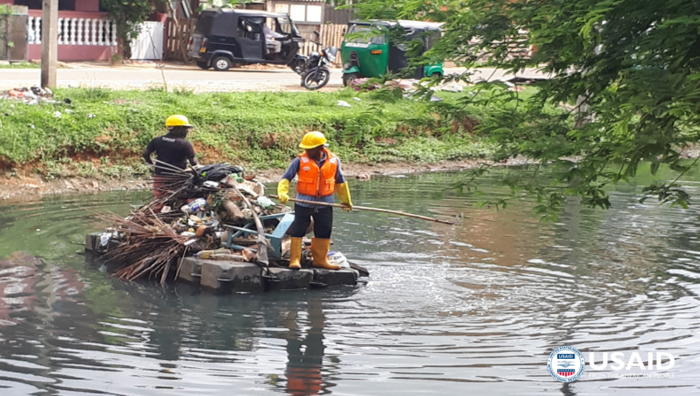
Mismanaged waste reinforces the important role of independent waste collectors. The Dehiwala-Mount Lavinia municipal council, located just outside of Sri Lanka’s capital Colombo, is recognizing the importance of independent waste collectors in waste management. USAID MWRP’s grantee Sevanatha has worked to create behavior changes in households and establishments to cooperate with municipal solid waste collection processes. Behavior change, however, is a slow process and independent waste collectors are continuing to scoop floating plastic and other debris from the many canals coursing through the community – even during the COVID-19 pandemic. Sevanatha has developed a local solution for mismanaged waste with floating collection rafts and metal screen “waste traps” located at overpasses above canals, enabling the local authority to keep hundreds of kilograms of plastic waste from floating out into the nearby sea each day.
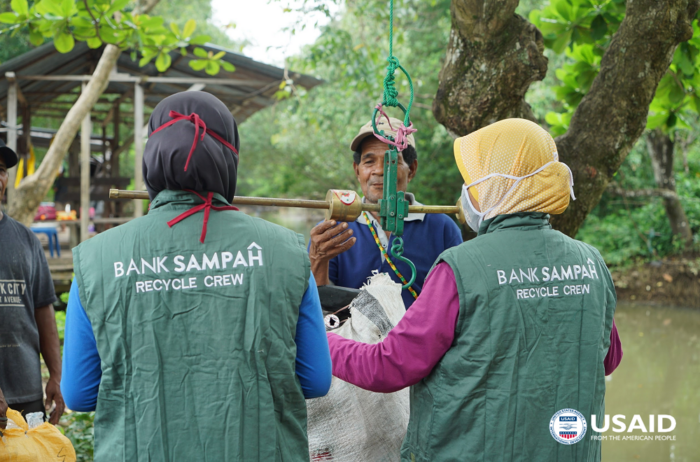
Community participation promotes local self-reliance in waste management. In Sorong City, West Papua, in Indonesia, trained community waste bank (bank sampah) members receive and weigh plastic waste in their neighborhood. A USAID MWRP grantee, the Misool Foundation, has organized more than 100 waste banks and operates a large recycling center that consolidates waste collected throughout the city. The waste banks use the generated funds (from recyclables) to finance waste projects or to help support neighbors with urgent needs. Misool works with the Sorong City government to raise public awareness of the importance of recycling and protecting the region’s marine ecosystem. In all of MWRP’s partner waste banks, community members volunteered as independent waste collectors to continue the USAID-supported waste collection and recycling work.

